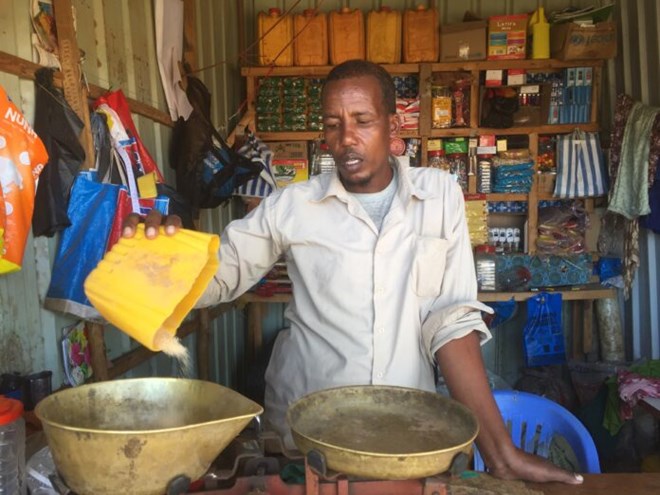
Abdullahi Ali Abdi sells every kind of food item at his shop in Dugandug market that families living in the sprawling displacement camps outside the southern Somali city of Baidoa could want.
The shop saves his customers a journey to the city market and also provides Abdullahi with a reliable, independent living.
“I couldn’t just sit around any longer and wait for aid,” Abdullahi told Radio Ergo, who has lived for more than a year with his family in Lawiley IDP camp.
“I used to live with uncertainty before I opened this shop, but now I know how much I can get from the sale of my products by the end of the day.”
He set up his business eight months ago with $150 borrowed from a relative and now has stock worth $500. He sells daily necessities such as cooking oil, rice, flour, spaghetti and sugar in small amount, with dry goods in packets of between 250 grams to a kilo.
Abdullahi makes an average of 300,000 Somali shillings a day that supports his family and has allowed him to enroll his children in school, paying $24 in monthly fees.
Like most of the displaced men and women running thriving businesses in Dugandug market, Abdullahi has no current plans to return home to Ufurow in Bay region, where the family abandoned their farm three years ago due to drought.
Dugandug was not planned as a formal market, but over the past year it has grown rapidly to house numerous shops and restaurants serving 12 IDP camps in this area, south of Baidoa.
Fadumo Mohamed Nur, 51, sells meat and vegetables. She goes to Baidoa to buy meat and vegetables worth a million shillings from butcheries and traders and sells it at her popular stall in Dugandug.
As a mother of six, whose husband died a year ago, she fled the drought in Qansahdhere in Bay region, where they were farmers.
“I am now leading a better life than I did before. I eat, drink and save up some money, all without depending on any aid or begging! I now earn my living on my own,” Fadumo told Radio Ergo’s local reporter.
Fadumo enrolled three of her children in school this year and pays $18 in monthly fees. She has also bought a plot of land for $2,000 and plans to build a house when she has saved enough to enable the family to move out of the camp.
Bilal Mohamed Ibrahim runs the only currency exchange service in Dugandug market, which he began with just $20 changed into Somali shillings.
“Starting this business had made a lot of difference to my life. I leave my workplace feeling happy every day and it has been an escape from my worries,” said Bilal, who lived for four years on aid with his family of seven.
Stall holders pay rent of $15 a month to the local landowners, according to Abdullahi Maalin, the chairman of Lawiley camp, although it is not clear whether the authorities may at some point require the stalls that have encroached on the roadside to move.
“This market has grown since when traders used to buy a box of spaghetti in Baidoa and go back for another box two days later,” he said.
“Today as you can see there are hundreds of different businesses selling everything people need here.”
https://hiiraan.com/news4/2019/Oct/...services_to_displaced_somali_communities.aspx
